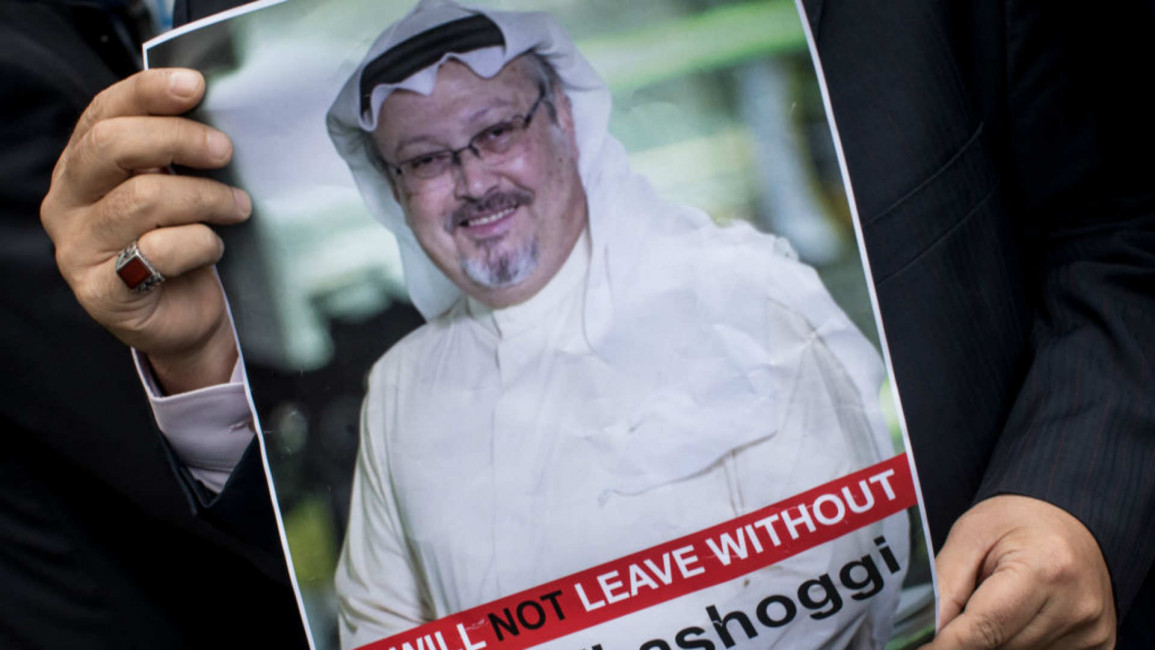
What the newly released CIA documents on Khashoggi tell us
The Open Society Justice Initiative, the legal arm of the Open Society Foundations, had initially filed suit in January for the release of the documents under the US Freedom of Information Act (FOIA).
The documents will be released at an impressive rate of 5,000 pages per month, until the total 300,000 pages held by the State Department, Department of Defence, and CIA are publicly available.
Judge Engelmayer explained that, because the documents contain information "of intense interest among the public, legislators, other policymakers and journalists," their timely release is of "paramount public importance and urgency."
Representatives from the State Department had initially argued that producing 5,000 pages per month would require between 60-73 workers to sift through records and thus slow the processing of 98 percent of other FOIA requests that are not in litigation, yet the judge deemed the case important enough to require the extra resources.
A lawyer for Open Society dubbed this ruling, and the urgency with which it is being pursued, "a meaningful clarification of US obligations to disclose under FOIA."
The first set of these documents was released in the first week of August and contains documents from the Central Intelligence Agency, Department of Defense, Department of State, Director of National Intelligence, and National Security Agency.
Many of the documents released contain emails responding to enquiries from the media as new details of the crime emerged, and there was considerable reference back to White House talking points through briefings by Sarah Huckabee Sanders.
 |
It is difficult to know what red lines still exist for the Saudi government |  |
The talking points of particular importance were, rather unsurprisingly, the strong defence relationship with Saudi Arabia and the importance of this relationship for countering terrorism and ensuring regional security, even though support to the Kingdom was described as "not unconditional."
It will be interesting to see how the responses to enquiries change after the UN report, which dubbed Khashoggi's killing "premeditated extrajudicial execution, for which the State of Saudi Arabia is responsible," was released in June.
Based on what has so far been released, we can draw three broad conclusions.
First, what becomes clearest from the hundreds of pages that have been released is the difficulty with which the intelligence community has had to coordinate messaging with the White House, particularly as more details emerged about Jamal Khashoggi's murder.
 |
|
The intellectual gymnastics required of the rest of the government to respond to President Trump and White House Press Secretary Sanders's statements is as difficult as we would expect, and the rest of the government is struggling to stay on message, especially considering the president himself is hardly consistent.
Second, because Jamal Khashoggi's murder in the Saudi consulate in Istanbul appears to be an unprecedented act of state violence, it is difficult to know what red lines still exist for the Saudi government.
A recent Vanity Fair article highlighted other stories of dissidents who had been tracked abroad, demonstrating that those who have escaped the kingdom are also still very much under its control. Further, some of the documents contain media inquiries into whether Saudi Arabia was responsible for the killing of Iranian activist Ahmed Mola Nissi in the Netherlands in November 2017.
 |
The intellectual gymnastics required of the rest of the government to respond to President Trump and White House Press Secretary Sanders's statements is as difficult as we would expect |  |
The documents also contain rumours that Mohammed bin Salman had said he would shoot Jamal if he did not take a job offered him at the Saudi news outlet, Al Arabiya. In a world in which a journalist is allegedly killed at his country's consulate on orders of the crown prince, it is difficult to know what stories are too outlandish to be believed.
Third, the US-Saudi relationship is likely to remain under scrutiny, demonstrating the extent to which the Saudi government underestimated the impact of Khashoggi's murder.
Read more: In the Trump era, Saudi Arabia no longer needs to outsource its lobbying to think-tanks
As much as Trump has tried to downplay the incident, even dismissing the UN's request for an FBI investigation into Khashoggi's murder, it seems likely that other parts of the government will hold him to account.
Indeed, the House of Representatives voted in July to block arms sales to Saudi Arabia - a move that ultimately was overridden by Senate, but represents the extent to which the Saudi relationship remains on the agenda.
Further, with the 2020 elections on the horizon, the issue of candidates' stances toward Saudi Arabia has become a means of judging their foreign policy.
 |
The documents will likely unveil more information about how the US-Saudi relationship is being managed beyond the White House |  |
The gradual release of the documents related to the Khashoggi murder will likely unveil more information about how the US-Saudi relationship is being managed beyond the White House.
Trump, nine months after Khashoggi's murder took place, and the same month the UN report on the killing was released, dubbed Mohammed bin Salman "a friend of mine" and praised him for "hav[ing] done a spectacular job," illustrating the extent to which public opinion about the US-Saudi relationship is largely irrelevant.
The president's stance of unwavering loyalty also makes it difficult to deal with facts on the ground of what the Saudi regime has done and reveals how personalistic Trump's foreign policy is, making it more difficult for the rest of the government to respond to.
Dr Courtney Freer is a senior advisor at Gulf State Analytics and a research officer for the Kuwait Programme at the London School of Economics and Political Science.
Follow her on Twitter: @CourtneyFreer
Opinions expressed in this article remain those of the author and do not necessarily represent those of The New Arab, its editorial board or staff.




